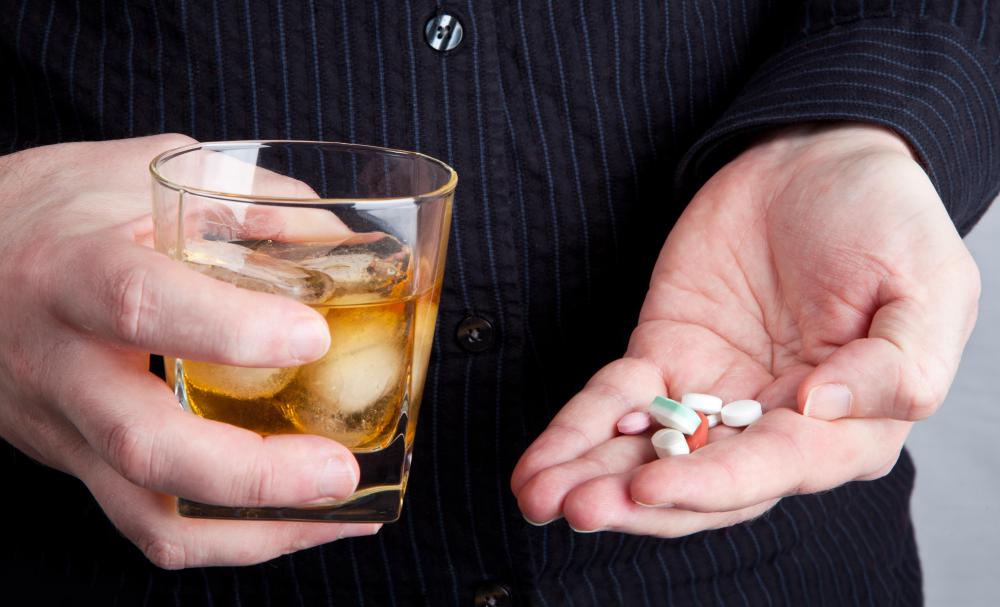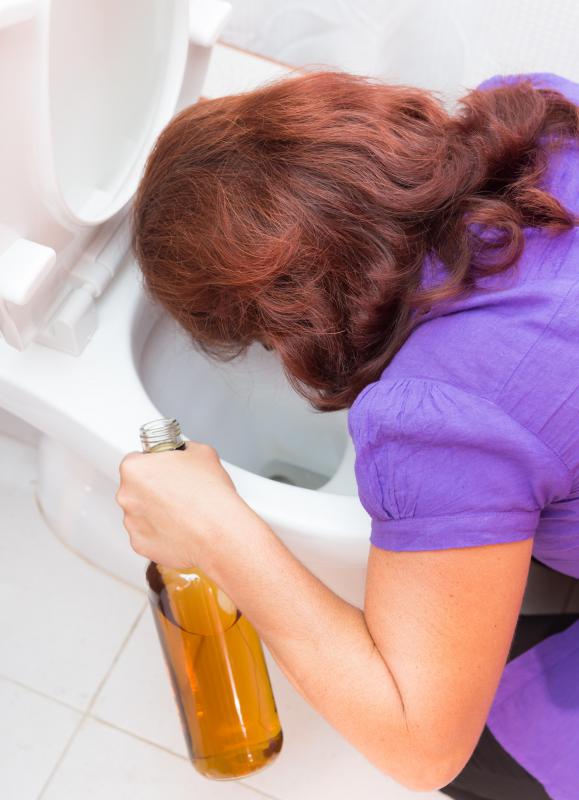At TheHealthBoard, we're committed to delivering accurate, trustworthy information. Our expert-authored content is rigorously fact-checked and sourced from credible authorities. Discover how we uphold the highest standards in providing you with reliable knowledge.
What Are the Risks of Combining Alcohol and Citalopram?
Patients taking the SSRI citalopram for issues such as depression, anxiety disorders, and eating disorders are typically encouraged to avoid alcohol use, as the combination of the two can lead to several issues. For those with depression, combining alcohol and citalopram can actually worsen their condition. Drinking can also worsen certain side effects of citalopram, like dizziness or drowsiness, which can in turn make certain activities risky. In some cases, people take citalopram to treat alcohol dependency, so drinking while taking it defeats the purpose. Some patients also report that the negative effects of an alcohol hangover are intensified when they use the two together.
Combining alcohol and citalopram can be especially problematic for patients taking the drug for depression. The two drugs affect the same chemicals in the brain, and using both at the same time can actually worsen depression because of this. This can therefore undermine the reason a person was using citalopram in the first place.

Certain side effects that can be experienced when using citalopram can be made worse by drinking alcohol. Many patients feel drowsy, confused, or lightheaded when they take the medication, and drinking can intensify that reaction. Feeling sleepy or dizzy can make it dangerous for patients to engage in activities like driving, and increasing these sensations only increases the risk. If the person's ability to concentrate or comprehend information is affected, he or she may be more likely to make poor decisions while under the influence of the two drugs.

One of the issues for which citalopram is prescribed is the treatment of alcohol dependency. For patients in this situation, the goal of treatment with this drug is to help them overcome abuse of alcohol. Therefore, combining alcohol and citalopram is a risk for them simply because it means they are undermining their treatment plan. These patients may wish to consult with their doctor to see if another course of treatment would work better for them.

Drinking too much alcohol often leads to a hangover, with associated symptoms like headache, nausea, and shakiness. When alcohol and citalopram are combined, some patients find that their hangovers are much more intense the following day. This may be due to the intensifying effects the two have on each other, or because some of the side effects that can be experienced with citalopram are similar to those felt with a hangover.
AS FEATURED ON:
AS FEATURED ON:















Discussion Comments
I drank once or twice when I was on citalopram. I didn't experience any psychological side effects, just physical ones. I was very drowsy and I had an upset stomach with nausea. And mind you, this was only from one or two drinks.
@ddljohn-- I'm not in a position to advise you as I'm not a doctor or expert. But I know from personal experience that citalopram and alcohol do not mix well. It is generally not advised to drink alcohol while being treated with antidepressants or anti-anxiety medications. And this is not just because of the possible side effects, which can be severe in some cases, but also because alcohol worsens depression.
I was treated with citalopram for several years. I did not drink alcohol at all during the first year of my treatment. The drug was working very well. My depression and anxiety was gone. I was calm and positive. Then one day, my friends convinced me to have a few drinks while we were out. The next morning I woke up in the worst state possible. I was depressed, had severe anxiety as well as suicidal thoughts. Moreover, I was hung-over. The medication had lowered my tolerance to alcohol. I was vomiting and had a terrible headache on top of it.
At that moment, I felt like my whole treatment had gone to waste. The alcohol took me back to how I used to be one year ago. I decided at that moment that I would never mix antidepressants with alcohol. I suggest that you do the same. We are trying to get well and alcohol does not help.
I was previously being treated with escitalopram by a different doctor. That doctor had allowed me to have a few drinks every once in a while during my treatment. It has been several years since and I've moved and I have a different doctor. My new doctor is treating me with citalopram but told me that I cannot have alcohol. I don't understand this because I thought that escitalopram and citalopram are basically the same drug or at least very similar. I'm not sure if I should drink alcohol or not.
Post your comments